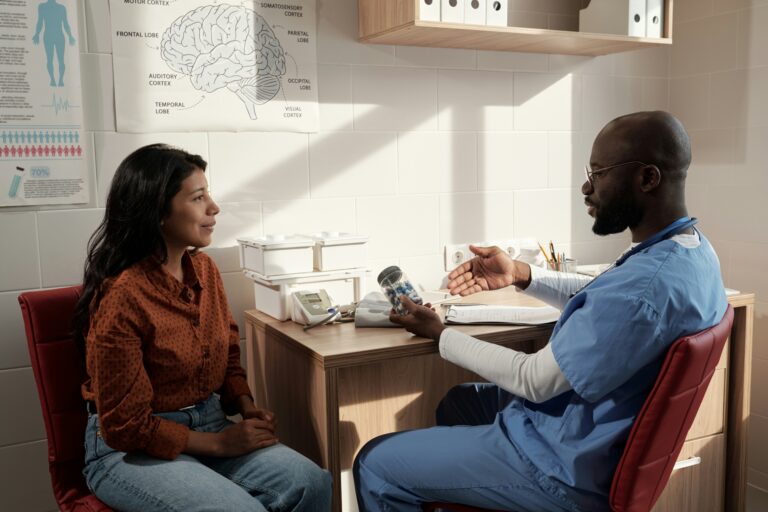If you’re on a journey to have a baby and are struggling with infertility, it can feel overwhelming when it comes to figuring out who to go to for help. With so much information (and just as many questions), knowing what works for you and your needs is hard. That’s where a reproductive endocrinologist can help.
An endocrinologist is a medical professional who specializes in the endocrine system, the network of glands that creates hormones to help cells communicate with each other. They are a key part of the fertility puzzle within the medical system, and largely considered the experts at the top of their field.
“A reproductive endocrinologist specializes in diagnosing and treating hormonal and reproductive disorders that affect fertility. They assist individuals and couples facing infertility by offering treatments such as IVF, IUI, and hormonal therapy,” Dr. Amy Divaraniya, PhD, the founder and CEO said. “They also help manage conditions like PCOS and endometriosis that can impact conception. Importantly, reproductive endocrinologists specialize in both men’s and women’s reproductive health.”
When it comes to fertility issues, early intervention is crucial. While it is undoubtedly challenging to face the reality of fertility complications, with more information, you have power and you can make decisions for your health and your future with the help of a doctor who understands how to navigate every issue and question. Early intervention and knowing when to hire a reproductive endocrinologist can help you understand your body and cycle— and provide guidance on your path to becoming a parent.
Here, we provide the 101 guide on a reproductive endocrinologist:
- Understanding Fertility Challenges
- When to Hire a Reproductive Endocrinologist
- Benefits of Early Intervention
- Finding a Reproductive Endocrinologist
Understanding Fertility Challenges
Before knowing when to hire a reproductive endocrinologist, you should understand that fertility comes in many different forms. Here are some of the most common fertility issues women face:
- Ovulation disorders: This refers to several conditions that can affect your endocrine system, which controls your ovulation patterns and hormones. This can cause infrequent or irregular ovulation or even the absence of an ovulation cycle.
- Endometriosis: This is a condition in which tissue similar to the inner lining of your uterus grows outside of your uterus. It can negatively affect your fallopian tubes, the tissue around your pelvis and your ovaries. Endometriosis can block your fallopian tubes or disrupt the way your eggs are fertilized, causing infertility.
- Polycystic Ovary Syndrome: This condition, often referred to as PCOS, affects one in ten women of childbearing age. It causes a hormonal imbalance, lack of ovulation and irregular periods, all of which can make it challenging to become pregnant.
- Male infertility: It’s not talked about a lot, but women are only one-half of the infertility puzzle. Men may have infertility due to low sperm production, abnormal sperm function or blockages that make it difficult for the sperm to reach an egg.
Age can also impact your fertility: A a woman in her early to mid-20s has a 25 to 35 percent chance of becoming pregnant every month. When a woman is 40, that chance drastically reduces to five percent. “Women are born with all of the eggs they will ever have, which is approximately one million eggs. By the time of her first period, her egg numbers had dropped to around 100,000— without ever having ovulated. And it’s not just about quantity – the quality of eggs also diminishes with age, making it harder to get pregnant with a healthy and viable fetus,” explains Jenna McCarthy, MD, FACOG, a reproductive endocrinologist and infertility specialist (REI) at IVFMD.

When to Consider a Reproductive Endocrinologist
Knowing when to hire a reproductive endocrinologist can make all the difference in your fertility journey. Keeping an eye on your body and the signs it’s giving can help you know when to seek specialized care from a medical professional. Usually, if you’ve been trying for a year under the age of 35 or six months over the age of 35, your OB/GYN might recommend seeing a fertility specialist to help you navigate your TTC journey. Some reasons you may want to see a reproductive endocrinologist include:
- You have an abnormal period, irregular period, no period or very painful periods.
- You notice a change in your sex drive, hair, skin or abnormal weight gain.
- You see a milky white discharge from your nipples.
- You experience pain during sex.
- You have a history of miscarriages.
- You’ve been diagnosed with the conditions we listed above.
- You’ve been trying to conceive for a while and have had no success.
Important note here: if you or your partner have a personal history that puts you at risk for infertility, go see a reproductive endocrinologist when you are ready to start trying. Do not wait, urges Dr. Jessica Vernon, MD, PMH-C, a board-certified OB/GYN. “It is very helpful to see your gynecologist for preconception counseling so they can take a thorough history and note any risk factors. They can also let you know if any medications or recreational substances you or your partner are using may be unsafe for pregnancy or decrease your fertility,” she adds.
Benefits of Early Intervention
If you’re experiencing any of these, it’s so important to seek help sooner rather than later. Delaying seeking help can actually limit your options to have a baby, especially as we age. One of the advantages of early intervention is that you can know if you have any of the fertility issues we listed earlier like PCOS or endometriosis. This can help you quicker navigate the treatment options you have for your condition and know what you’re up against.
Another reason for early intervention is you know sooner if you need to freeze your eggs and/or embryos to preserve your fertility. Freezing your eggs can maintain their quality and allow you to have your baby later in life. Ultimately, early diagnosis, intervention and treatment will lead to better outcomes and help you feel more prepared when you enter your fertility journey.
Finding a Reproductive Endocrinologist
“A good starting point is to ask your primary care physician or OB-GYN for referrals to specialists in your area,” Divaraniya says. She notes you can also search for ‘board-certified reproductive endocrinologists’ through professional organizations like the American Society for Reproductive Medicine (ASRM) or the Society for Assisted Reproductive Technology (SART). She also recommends reading patient reviews to help make an informed choice.
While no one wants to think about cost, fertility treatments are expensive, so it’s important to remember your insurance coverage and budget. Determine whether your insurance covers the treatments you are seeking.
Are you ready to take that next step in your fertility journey? Knowing when to hire a reproductive endocrinologist and deciding earlier rather than later can increase your chances of success. Fertility can feel incredibly isolating. But remember, you are not alone. So many women and couples are facing the same struggles. You’ve already shown strength and courage by reading this article and being proactive. Don’t forget to give yourself grace and kindness. You got this.
Author
-

Esha Minhas is a third-year student at Northeastern University studying Journalism and Political Science. She's currently the editorial and social intern for Mila & Jo Media. Esha is also the Deputy Sports Editor for The Huntington News and covers Northeastern men's hockey. When she's not busy with work or school, you can find her at the gym, baking for her friends and family and watching anything sports related.
View all posts





